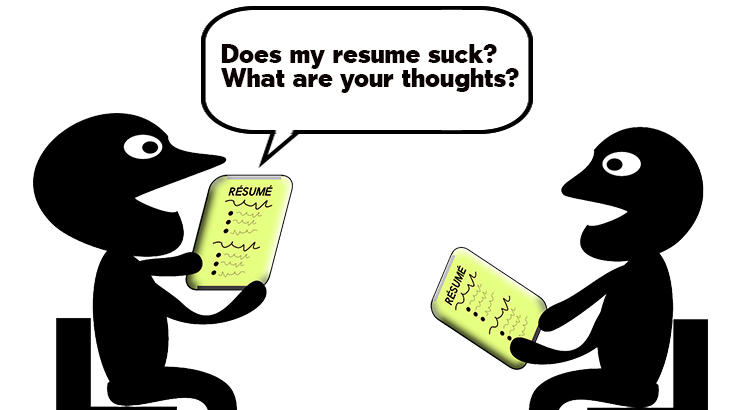We already talked about the most cringe-worthy resumes we believe are destined for the trash bins. Today, we’ll talk about writing the best resume, and hopefully, help you land your dream job.
I hope you find this helpful. Share your thoughts in the comment section below.
Follow the “Rule of Seven”.
Your resume is the conveyor of your personal brand. A crucial part of branding is consistency. You must send a consistent message — a message aligned to what you are getting into. This kind of resume make recruiters think, “this person has done this before. If we hire her, she’ll fit right in” – that’s the best resume.
Prior to writing your resume, contemplate on the kind of message you want to send – your personal brand, so to speak.
In writing the resume, follow the “rule of seven”. Use buzzwords, and their derivatives, on the company’s website, and repeat them seven times in your resume.
For example, in the marketing industry, verbs like “marketed”, “advertised”, and “promoted” are some of the buzzwords you can use in your resume. If you are applying to a startup, you can try buzzwords like “built”, “created”, “devised”, or “initiated”. The secret is getting to know the industry’s lingua franca (bridge language or common language), and using it in your behalf.
Example:
- For Marketing Job: “Marketed YouTube Campaign Video featuring Rappler Thought Leader Nicole Curato (500,400 views)”
- For Startup Job: “Created YouTube Campaign Video featuring Rappler Thought Leader Nicole Curato (500,400 views)”
In marketing, we have a very old adage that says customers must see an advertisement seven times before they take action. The same principle applies here. Position yourself properly so recruiters know you are a fit.
Additionally, if you’ve done an internship in the summer, don’t put it simply as “summer intern”. Use relevant buzzwords. Alternatively, you can use “marketing intern”, or “research intern”, instead of just “summer intern”. Moreover, you can add a “Relevant Courses/Coursework” Section in your resume for more options for personal branding. If you are applying for a marketing position, you can list marketing subjects or courses you’ve taken in the past in that section.
Sometimes… numbers speak louder than words.
Greek philosopher Aristotle taught the three pillars of persuasion: ethos, pathos, and logos. Ethos is an appeal to ethics, and it is a means of convincing someone of the character or credibility of the persuader. Pathos is an appeal to emotion, and is a way of convincing an audience of an argument by creating an emotional response. Logos is an appeal to logic, and is a way of persuading an audience by reason.
Aside from logical correctness, quantitative evidence is also a cornerstone of logos. Show your accomplishments in numbers, not just words. Only a few applicant do this, so if you do this you will certainly stand out. Quantify your accomplishments by answering the question “how much” whenever appropriate. Remember, by quantifying your impact, you’re doing exactly that. You’re providing evidence to underscore the significance of your accomplishments.
Examples:
- Weak: Managed a budget to plan a large-scale events for students.
- Strong: Managed 50,000 peso budget to plan a large-scale events for 3,000 students.
- Weak: Wrote articles on B2B marketing and information technology.
- Strong: Wrote 12 articles on B2B marketing and information technology, generating 230,000 pageviews, 7,003 likes, and 11,723 tweets
Build your authority by associating with big brands.
Robert Cialdini, professor Emeritus of Psychology and Marketing at Arizona State University, says that wilding authority is one of the ways to sell yourself. And, if you don’t have it, the best way to convey authority is by associating yourself with those who do.
So, build instant credibility by associating yourself with trusted institutions (even if you have never directly worked for one).
Were you featured in any major publications? If you worked at a startup, was is backed by notable venture capitalists? Know that known and trusted brands shine when recruiters scan resumes so find a way to include them.
Examples:
- Strengthened relationships with 7 strategic partners (including Coca-Cola, Procter & Gamble & Philippine Airlines) through follow-up meetings with senior leadership.
- Hired and managed 12 students from UP and Ateneo including programmers, salespeople, and graphic designers.
Show the competition.
I was guilty of this (not showing the competition).
Many of us have won awards, got into selective programs, or did other impressive things. However, we fail to convey the amazingness of those accomplishments. How is this so?
When we list our achievements and awards, we fail to show the competition: How many other people were vying for the same spot?
Let me show you this.
- Weak: Accepted into Friedrich Stiftung International Academy of Leadership
- Strong: Accepted into Friedrich Stiftung International Academy of Leadership (9% admit rate, FS-IAL selects 25 young professionals per year)
- Weak: Member-proponent of the Philippine Team in the 2011 Ecopreneur International Business Planning Competition in Mongolia
- Strong: One of the three-group Philippine Team in the 2011 Ecopreneur International Business Planning Competition in Mongolia (won $2,000 for “Most Feasible Business Plan Award” besting 160 entrepreneurs from 44 startups in the international competition; bested 100+ contenders in the Philippine Competition)
How does this work? According to Professor Cialdini, social proof is one of the most powerful principles of influence. By showing your competition, you emphasize how coveted your accomplishments are. By doing this, you safeguard yourself in case the recruiter hasn’t heard of your program, award, or honor – which they most likely haven’t and won’t bother looking up.
Ask an employee for feedback.
Are you in LinkedIn? I hope you are.
Before applying to any company, try to connect with an employee – whether through information sessions, introductions (you can do that in LinkedIn), or alumni outreach. Try to start a small tall, and if the conversation goes well, kindly ask for feedback on your resume before applying.
How does this work?
First, it’s an extremely efficient way to customize your resume to different companies. Employees offer highly specific edits (“hey try using this buzz word, we love that”).
Secondly, this is an awesome way to internally pass along your resume without even asking. If an employee finds you impressive, kind, and sincere, there’s a good chance they’ll put in a word with recruiters.
Take this as an example:
Hey Ehf,
Great chatting yesterday! I really enjoyed hearing about your experiences at [Company X] and I’m excited to apply for [Position Y].
I know you’re super busy, but could you spare 2 minutes to share any feedback on my resume before I submit? Even a quick gut reaction would mean a lot.
Best,
Slye
Does this really work? In psychology, this is called “Foot-In-The-Door Phenomenon”. This refers to the people’s tendency to more readily complete larger requests after they’ve already agreed to smaller ones.
Requesting two minutes of their time to review your resume and give you a feedback is an easy starting point if you’ve built rapport beforehand (remember, the chitchat). Who knows? They might help you out in bigger ways like making referrals, and brokering introductions among others.
Make Your Interests As Quirky As Possible
In Give and Take, Wharton professor Adam Grant emphasizes that similarities matter most when they’re rare. “We bond when we share uncommon commonalities, which allow us to feel that we fit in and stand out at the same time,” he says. So, when you are listing your interests, explore some quirky sides of you. Instead of saying you like movies, or travelling, say something that could strike an emotional chord or spark a memorable conversation (e.g. Has Lego Star Wars Collections, Loves Mediterranean Cooking, etc.). But, be specific about it.
Remember, recruiters scan a lot of resumes, and interview a lot of candidates. While they may be taking down notes, the truth is that they’ll remember you for some exotic reasons. They’ll probably remember you as “the guy who has Lego Star Wars collections”, or “the prima ballerina”. So, good luck. Remember, the quest to refine your resume never ends, tweak it as needed.
Good luck, and happy writing!

